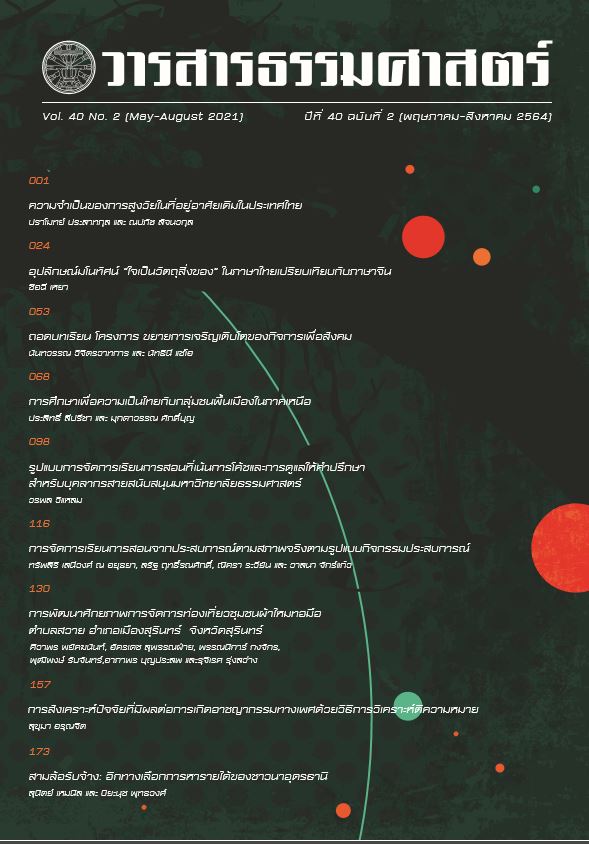Conceptual Metaphor “HEART IS AN OBJECT” in Thai in Comparison with Mandarin Chinese
Main Article Content
Abstract
The purpose of this article is to study and compare the concept of “HEART IS AN OBJECT” in both Thai and Chinese language when the word “HEART” is used as a metaphor in both languages. The results indicated that the process of conceptualization of all Thai and Chinese language users on “HEART” could be considered as a cognitive procedure of metaphorical concept construction. The concept of “HEART” is regarded as one's understanding of physical objects or valuable entities. It makes “HEART” concept to be understood by relying on more concrete objects in order to summarize abstract concepts more clearly. Thus, it can be seen that conceptual metaphor in divergent languages and cultures not only exists universal characteristics. But for the conceptual system of each ethnic group reflected by the usage of metaphorical language, it also exists mutual characteristics. At the same time, conceptual formations or conceptualizations of “HEART” in Thai and Chinese share many similarities, figurative meanings and linguistic representations in each language, yet they also have many differences as a result of each country’s inherent culture. In addition, it was also found that some examples that only appear in each language.
Article Details
References
CASS Institute of Linguistics Dictionary. (2016) . The Contemporary of Chinese Dictionary (第 7 版)(现代汉语词典 7th ed.). Beijng: The commercial press.
Chandler, J., Reinhard, D., & Schwarz, N. (2012). To judge a book by its weight you need to know its content. Journal of Experimental Social Psychology, doi:10.1016/j.jesp.2012.03.003
Chen, F., & Zhang, J. (2010) . The Contrastive Study of Ontological Metaphor in Classical Poetry—Take Japanese tanka poetry and Chinese tangshi poetry as an example (古典诗歌中的实体隐喻认知对比研究—以日本短歌与中国 唐诗中的“心”为例) . Journal of Xi’an International Studies University. 18(2), 47-50.
Fang, L. , & Jiang, W. (2013) . “Heart as a Thinking Organ” : A Philosophical Interpretation of Metaphoric Thingking “Heart” and Corpus Analysis (“心 为思官”: 汉语“心”的思维隐喻哲学疏解及语料分析) . Journal of Zhejiang Ocean University (Humanities Science), 30(5), 37-41.
He, J. (2008). Metaphorical Study of Xin in Chinese Philosophical Discourse. Master of Arts (Foreign Linguistics and Applied Linguistics) . Faculty of Foreign Language. Changsha University of Science and Technology.
Huang, Q. (2014). A Study on the Cognitive Features of HEART in Xi You Ji. Master’s thesis (Foreign Linguistics and Applied Linguistics) . Faculty of Foreign Language. Guangxi University for Nationalities.
Jostmann, N. B., Lakens, D., & Schubert, T. W. (2009). Weight as an embodiment of importance. Psychological Science, 20, 1169–1174.
Lakoff, G., & Johnson, M. (1980). Metaphors We Live By. Chicago, IL: University of Chicago Press.
Lakoff, G., & Johnson, M. (2003). Metaphors We Live By. Chicago, IL: University of Chicago Press.
Lyons, J. (1977). Semantics. Cambridge: Cambridge University Press.
Li, Q. (2006). Emotional Metaphor and Metonymy in Chinese Characters with the Radical of “ Heart” — A Cognitive Case Study. Master’s thesis (Foreign Linguistics and Applied Linguistics). Faculty of Liberal Arts. Dalian University of Technology.
Matisoff, J. A. (1986). Hearts and minds in South-East Asian languages and English: an essay in the comparative lexical semantics of psycho-collocations. Cahiers de linguistique Asie orientale, 15(1), 5-57.
Niemeier, S. ( 2003) . Straight from the heart-metonymic and metaphorical. Metaphor and metonymy at the crossroads: A cognitive perspective, 195.
Pérez, R. G. (2008). A cross-cultural analysis of heart metaphors. Revista Alicantina de Estudios Ingleses/Alicante Journal of English Studies, (21), 25-56.
Schneider, I. K., Rutjens, B. T., Jostmann, N. B., & Lakens, D. (2011). Weighty matters: Importance literally feels heavy. Social Psychological and Personality Science, 2, 474–478.
Wang, W. (2009). A Study of Structure and Metaphor for “ Heart/Xin” Based on Function Notion and Time-Space Dimension in Both Chinese and English. Master's thesis (English Language and Literature) . Faculty of Foreign Language. Jiangxi University of Finance and Economics.
Wu, E. (2004). On the Metaphorical Cognitive System of “Xin” in Chinese (论汉语 “心”的隐喻认知系统). Language Teaching and Linguistic Studies, 6, 49- 55.
Xiang, C. (2010). The “Heart as Ruler” Metaphor: A Cognitive Account (“心为主” 隐 喻的认知分析). Language Teaching and Linguistic Studies, 31(1), 80-87.
Xiao, R. (2007). A Contrastive Analysis of the lexical of “heart” in Chinese and Thai. Master's thesis (Foreign Linguistics and Applied Linguistics). Faculty of Literature and Journalism. Yunnan Normal University.
Yu, N. (2007). The Chinese conceptualization of the heart and its cultural context: Implications for second language learning. In Applied Cultural Linguistics: Implications for Second Language Learning and Intercultural communication, Farzad Sharifian and Gary B. Palmer (eds.) , 65–85. Amsterdam/Philadelphia: John Benjamins.
Yu, N. (2008) . The Chinese heart as the central faculty of cognition. Culture, Body, and Language: Conceptualizations of Internal Body Organs across Cultures and Languages, F. Sharifian, R. Dirven, N.
Yu, & S. Niemeier (eds.), 131–168. Berlin/New York: Mouton de Gruyter.
Yu, N. (2009). The Chinese HEART in a Cognitive Linguistic Perspective : Culture, Body and Language. Berlin/New York: Mouton de Gruyter
คฺยอง อึน ปาร์ค. (2554). ปรากฏการณ์พหุนัยของคําว่า /gada/ ในภาษาเกาหลีเปรียบเทียบกับคําว่า ไป ในภาษาไทย: การศึกษาตามแนวภาษาศาสตร์ปริชาน. วิทยานิพนธ์ปริญญา ดุษฎีบัณฑิต, ภาควิชาภาษาศาสตร์, คณะศิลปศาสตร์มหาวิทยาลัยธรรมศาสตร์.
คฺยอง อึน ปาร์ค. (2558). มโนทัศน์ของคำว่า ใจ ในภาษาไทยเปรียบเทียบกับภาษาเกาหลี. วารสาร ศิลปศาสตร์, 15(2), 199-212.
ราชบัณฑิตยสถาน. (2556). พจนานุกรมฉบับราชบัณฑิตยสถาน พ.ศ. 2554. กรุงเทพฯ : นานมีบุ๊คสพับลิเคชั่น.
สุกัญญา รุงแจง. (2548). อุปลักษณ์เชิงมโนทัศน์ของการใช้คําว่า “ใจ” ในภาษาไทย. วิทยานิพนธ์ปริญญามหาบัณฑิต, สาขาวิชาภาษาศาสตร์, มหาวิทยาลัยธรรมศาสตร์, กรุงเทพฯ.

